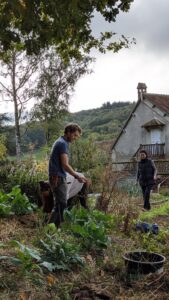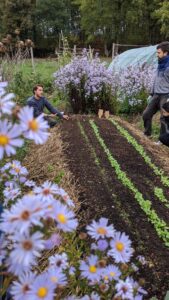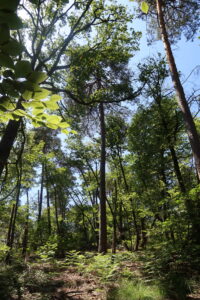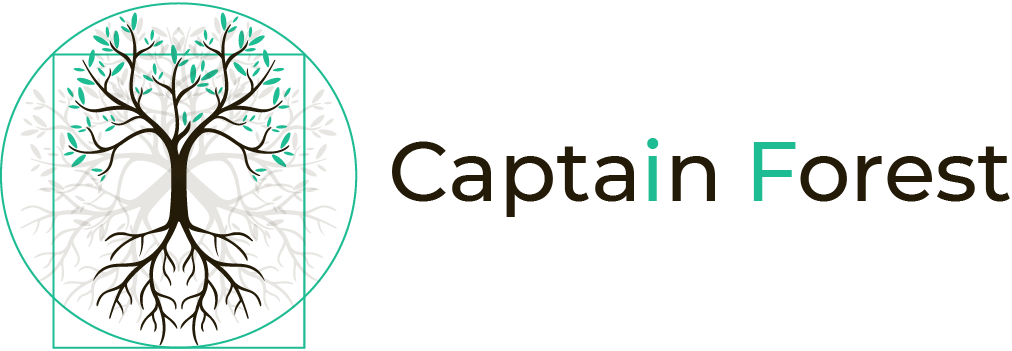Observation of Nature To Develop Ecological Consciousness

William van den Broek of Obrenan organizes introductory courses on permaculture in a farming village a few hours’ drive from Paris. I met him while partaking in this course.
William is passionate about Nature: he spends much time developing his scientific knowledge of the living world and is also in the field daily.
In this interview, William tells us about his relationship with the living world after several years of immersion in Nature.
He proposes another way of approaching the current ecological crisis: observation, knowledge of natural sciences, practice, wonder, and development of the senses.
Q: Can you share with us what you have learned from the plant world?
The plant world has nourished me, and has allowed me to develop.
The first thing I learned through contact with Nature is that to understand the living world, you must observe it while suspending your judgment. A common mistake is that most people approach Nature only through intellectual or theoretical means, whereas observation without judgment allows us to take a fresh look.
The second thing I learned is that observing Nature connects us to the cosmos and allows us to understand that we are part of a bigger whole. While observing Nature, we can ask ourselves, for example:
- “Why is this limestone soil at 2,000 meters height while it used to be at the bottom of the sea?”
- “How can we explain erosion here?”,
- “why is this species the only one of its kind in Europe? And how did it end up so far away from its cousins?”
By asking myself all these questions and diving into books, I could connect the dots to the Earth’s great cycles and the depth of time, which is dizzying.
Gradually, we can see coherence in a cosmos that we barely grasp. It is lovely and soothing to realize that there is a higher order in the apparent chaos surrounding us.
The third thing I learned is that to grasp the essence of Nature, it is not enough to read books; we have to practice. For example, we can talk about love as much as we want, but without practice, do we really know it?

The fourth important thing I learned was to avoid boredom. Pascal said that “the misfortune of men comes from the fact that they are incapable of remaining alone in a room”. I would have replaced “room” with “garden,” and I fully agree with the rest.
Non-boredom comes from the fact that in Nature, everything moves so fast: you come back ten days later to the same place, even in a tiny garden, the vegetation has already changed – the soil, the insects, the colors, the state of the plants, everything. You travel without moving an inch; you just let time pass.
Nature is a cure for boredom! Moreover, prolonged boredom often leads to cynicism and drives us to seek frenetic, often harmful entertainment.
Finally, the fifth thing I have learned is to be amazed. Out in Nature, wherever I look, I see something that amazes me, and I learn. Nature brings joy and wonder.
Q: Why does feeling wonder matter?
I like Gilbert Chesterton’s phrase, “The world will never starve for want of wonders, but only for want of wonder“.
Often, we hear about ecological awareness only with moral arguments. If morality alone was sufficient to mobilize people, then we wouldn’t have a problem! However, it is clear, as evidenced throughout history, that labeling something as ‘bad’ would probably not keep them from doing it anyway.
I want to say to people: “Be amazed. Look at the thousands of things that surround you, that accompany you, and on which your life depends”.
Wonder leads to ecological awareness and, more importantly, initiates real change. We will have come a long way when habitat preservation will be more valuable than a new shopping center.
Ecological awareness starts with developing the senses rather than acknowledging morals.
Q: Can you tell us more about ecological awareness through a sensitive approach?
Today, the ecological awareness proposed to the general public is based on a moral approach. We present Humans as if they were in opposition to Nature, whereas they are part of Nature.
However, the logic of life is within us: Homo sapiens is a natural specie, and so is their behavior. An atypical specie indeed, but natural nonetheless. Our body is also an ecosystem that hosts and works with thousands of bacteria, fungi, viruses, and archaea species. Our body is in resonance and continuity with the rest of Nature.
Developing our body awareness and senses allows us to live harmoniously with Nature. It is soothing to realize that we are part of something bigger. It inspires us to respect life in all its forms.
Q: How did you manage to be in the field and in books simultaneously?
First of all, I like to go from the field to the book and vice versa. I mix theory and practice: I observe plants in different states when they are in flower, when they have just germinated, or in winter when they are bare.
This way, I understand plants in various dynamics. One can even notice a kind of “character” for each one! They can even become companions, whom we are happy to meet at the edge of a forest or on a battered slope of an industrial wasteland.
Then, I like to multiply the angles of attack to anchor new knowledge. So, I mobilize all my senses: I watch, touch, smell, and taste (with care) the plants.
Finally, it is essential to realize that knowledge comes from observing one’s ignorance. The volume of knowledge is phenomenal. Even if we learned everything, state of the art remains limited. In reality, we don’t know much about life on Earth!
We sometimes think we know everything, only to realize that there are still many mysteries.
How does a tree raise a hundred liters of sap per day to a height of more than 30 meters at the end of winter season, when the leaves have not yet appeared? We don’t know.

There is infinite information in just one square meter of grassland. We have to admit that we are ignorant.
Some people think that we are too late and that we have already discovered everything. But, the more we advance, the more we see that there are still so many things to discover, and each new answer opens dozens of other questions. It is dizzying and exciting!
Q: Don’t you think that sometimes we invent things that we shouldn’t?
Discovery and invention are different: a discovery is finding something that already exists but that we have not yet seen or understood (for example, a species or a planet), whereas an invention is creating.
Discoveries are advances, so we must continue to develop research. Inventions depend on the way we use them.
For example, after making discoveries in agriculture, companies created inventions, such as herbicides, tractors, etc. At first, these inventions worked well; they were tested locally and punctually and were the first approximation of reality.
However, after having deployed herbicides and tractors on a large scale, we realized the side effects: no yield improvement for 20 years in certain regions with large-scale crops, public health problems, soil erosion, desertification, etc.
Inventions are a simplification of a reality that is not fully understood. They work well enough for a while, then show their limits and generate negative externalities. Afterward, the technique sometimes cancels the positive effects that justify its initial use. Ivan Illitch calls it the counter-productivity concept.
Industrial agriculture has considered scientific advances without sufficiently integrating the negative externalities accumulated over time. Today, we must be humble and question our agricultural model. Saying I don’t know is not a “hippy” attitude, but the basis of the scientific mind if we believe Socrates!
Q: You talk a lot about observation; it’s one of the five lessons you learned from the plant world. Can you tell us more about it?
Observation is a latent state in which senses are very much present. It is a waking mode close to the meditative state. For me, it is an essential quality of a gardener, a farmer, or a botanist.
To observe, we need to re-learn how to learn. In other words, we need to learn like children do: by absorbing what they see with new eyes. What we must avoid is analyzing and judging quickly. Observing is a quality that we must develop over time.
By having this observer attitude, I am in Discovery Mode when I work. Developing this relationship with Nature is an eventual “reconciliation” with it. We should live our relationship with Nature as an exploration, not as an environmental crusade.
Q: A word to conclude this interview?
Today, I think that political ecology is becoming increasingly important in our societies. Many politicians or influencers have ecological anxieties and position themselves as saviors with an often simplistic and moralizing approach.
We must have humility. We are only one person among 7 billion people, and it is not a single human who will save the world.
To develop an ecological consciousness, perhaps we could immerse ourselves more in Nature, observe it like children, build our knowledge, and marvel. The actions resulting from humans genuinely appreciating the value of the living world will undoubtedly be wiser, more measured, and more enlightened.
To read the interview with Nicole Bernard explaining the relationship between developing self and ecological consciousness, click here
To know more about the sensitive approach and how to develop your six senses, click here.



